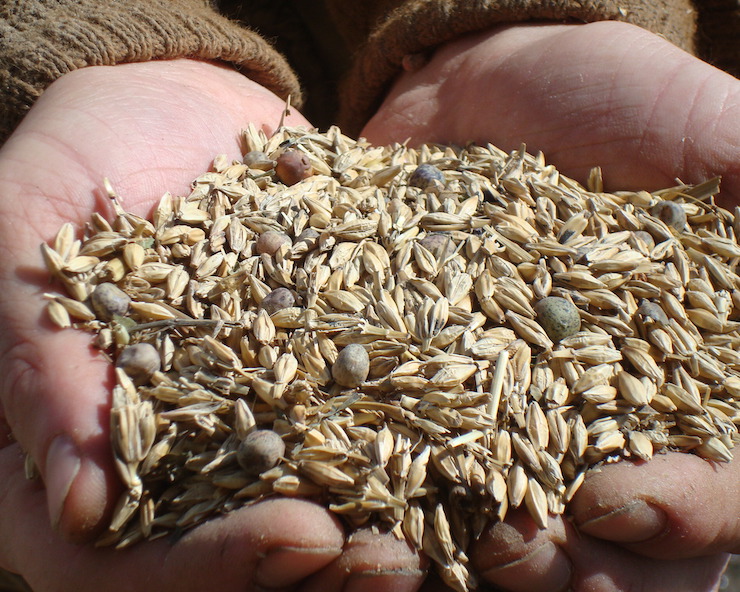Animals need fresh feed and water to stay healthy. Clean feed and water are also needed to produce good quality meat, milk, eggs, and fiber.
Feed
Buy feed from trustworthy sources. Keep records of the date feed was purchased or delivered. Save the feed label or tag in case of a recall. Examine feed for rodent droppings, insects, mold, unusual odors, foreign materials, or other contaminants. Do not feed if found. Wash your hands before and after touching the feed.
Feed Storage
Keep feed covered and out of the weather. Store feed bags off the floor or in containers with tight-fitting lids. Clearly label all feed containers. Clean up feed spills immediately.
Equipment
Use dedicated equipment for storing, handling, and preparing feed. Do not use feed equipment to handle waste or manure. If you do, clean and disinfect all equipment before using it to handle feed.
Feeding Practices
Do not feed animals directly on the ground. Use feeders, troughs, or bunks. Avoid placing new feed on top of old feed. Medications in feed or water should always be used under the supervision of a veterinarian. Always follow withdrawal times for medications. Use chemicals such as insect sprays carefully near feed or water sources. Always follow label directions.
Forages and Grazing
Check fields and pastures often for poisonous plants, debris, or other possible hazards. If you use herbicides, follow all label directions. Use extra caution in livestock grazing areas. Dry and store hay, alfalfa, and similar crops properly. Ensure they do not contain mold or pests. Spread out hay flakes or round bales to prevent animal crowding while eating. Rotate feed placement to prevent the build-up of feces near animal feeding areas.
Water
Provide clean water to all animals at all times. Test water once a year for substances that might be harmful to animals. Monitor ponds for blue-green algae blooms. These can be toxic to livestock, poultry, and dogs. Have a backup plan for natural water sources in case others become unsafe to drink. Prevent animals from contaminating fresh water sources. Do not allow animals to access wastewater or other contaminated water. Change or flush water sources at least weekly. Check and regularly flush automatic waterers to maintain proper function.
Cleaning and Sanitizing
Clean feeders and waterers at least weekly or sooner if needed. Remove debris in and around feed and water containers. Prevent water from pooling up around feeders and troughs. Place feed and water sources so that animals or people cannot step into them. Protect feed and water sources from urine and feces. Prevent wildlife activity around feeders and waterers in animal areas.
For More Information
- Managing Pasture Water, The Center for Food Security and Public Health, Iowa State University
- Nutrient Management on Livestock Farms: Tips for Feeding, Rutgers University
- Poisonous Plants, Cornell University
- Feed and Water Biosecurity Tip Sheet, The Center for Food Security and Public Health, Iowa State University

